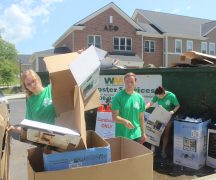Address to incoming Chapman Learning Community students, August 20, 2021 Tom Klein, Professor of English Emeritus:
We’re here because 25 years ago I had an epiphany, a realization that college and university education has a serious flaw. The flaw was structuring higher education on the 19th century German research university model rather than the 2000 year old approach of Socrates and Plato. The Germans divided knowledge into many parts and with lectures and readings, deposited that knowledge into students’ minds. Those statements can be stereotypes and often untrue.
Learning communities are different. They base teaching on the Socratic method where rather than lecturing to convey knowledge, Socrates asked questions so his audience could do their own thinking.
In the late 1990s, I gathered the BGSU’s Master Teachers (Holden, Midden, Nachbar, Ludd). We met often in 1997. The RLC was what we chose. We recruited 150 students for the coming fall.
Of course, it’s not easy to reshape something as large and fixed as a curriculum. But it took a year of meetings and we did it. At all levels, primary, secondary and college, I wanted to create education that brought together teachers from various disciplines, students and teachers, and students. That was radical, gathering a group of students to take a common core of specific courses. At that time, the “common book” movement was finding its power. LCs and Common Books are based on similar rationales.
In 1997, we had two common books in our first RLC:
Fall Semester: James Joyce, “Portrait of the Artist as a Young Man”
Spring Semester: “Zen and the Art of Motorcycle Maintenance: An Inquiry into Values,” Robert Pirsig.
In our kids’ bathroom in Austin, on the wall, hangs this poster:
Tie your shoes,
Pack a good lunch
And remember that we’re
All in this together.
What does that say to you? It says we are NOT Independent Free Spirits who can Tap Dance Around the Room and live fully independent lives. We’re essentially connected to everyone and everything. What you do and what you are can and probably will affect millions of persons. How could that be?
Covid taught us that almost everything is interconnected. One mistake in Wuhan China killed 4.5 million persons globally and 640,000 in the US. Two youngsters at Columbine HS, Klebold and Harris, killed 26 kids; they then became subjects of copycat killings. The Internet and the global economy – other forms of truth that we’re interconnected. The world’s droughts, extreme heat, winds and fires… 97% of climate scientists call that global warming. So what can you do about all that?
ONE thing: Get the best education you can. How can you do that?
SEVEN Things you need to Know about College Life
1. You’re on your own. Mom or Dad won’t rescue you but they’ll find out if you slip up. What you become and how you act affects everyone.
2. You’re here to get a practical-liberal education. What’s that? In a practical liberal education, the practical is the study of such subjects as accounting, nursing, computer science, electrical engineering – what one does to prepare for a job, an occupation, and often a life. A Liberal education is about learning things that lack an immediate payoff but pay off richly in the long run. Studying history, psychology, and literature will give you a larger mental and verbal vocabulary, a sense of global and national literacy, a better understanding about yourself and others. A liberal education can also reduce symptoms of depression and stress, and open doors to far away worlds. You ARE here to get a practical – liberal education. And I do NOT mean politically liberal. I mean the liberal arts.
3. Be a Reader to keep up with local, national, and world news. Read good daily or weekly newspapers and magazines. Subscribe and have them delivered to your room. If there are papers in your res hall, don’t let them go to waste. They are a perfect illustration of how we are all in this together! And you will be surprised that there’s a strong correlation between local and world news and your courses.
4. Treat all persons with respect, interest and consideration. Find and make a diverse set of friends including those who are different from you – politically, socially, economically. Reach out to the loner.
5. Beware of digital addiction, too much screen time that distracts from more important matters and oversimplifies. Facebook and Twitter can be short forms of communication that leave out complexity and the heart of communication. Facebook has been criticized for accepting and “printing” lies. This New Yorker Cartoon says it well: (Two men sitting at a table. One is typing on a computer. The other is speaking to him: “Why don’t you try a grand gesture, like a well-written email?”)
6. Make Wikipedia your friend but don’t believe everything it says.
7. Today’s readers and writers are tomorrow’s leaders. I already commented on reading. Writing is a very important exercise in learning, as important as reading. It allows you to gradually think through an idea and writing lives on paper.
Tom Kelin
Bowling Green

